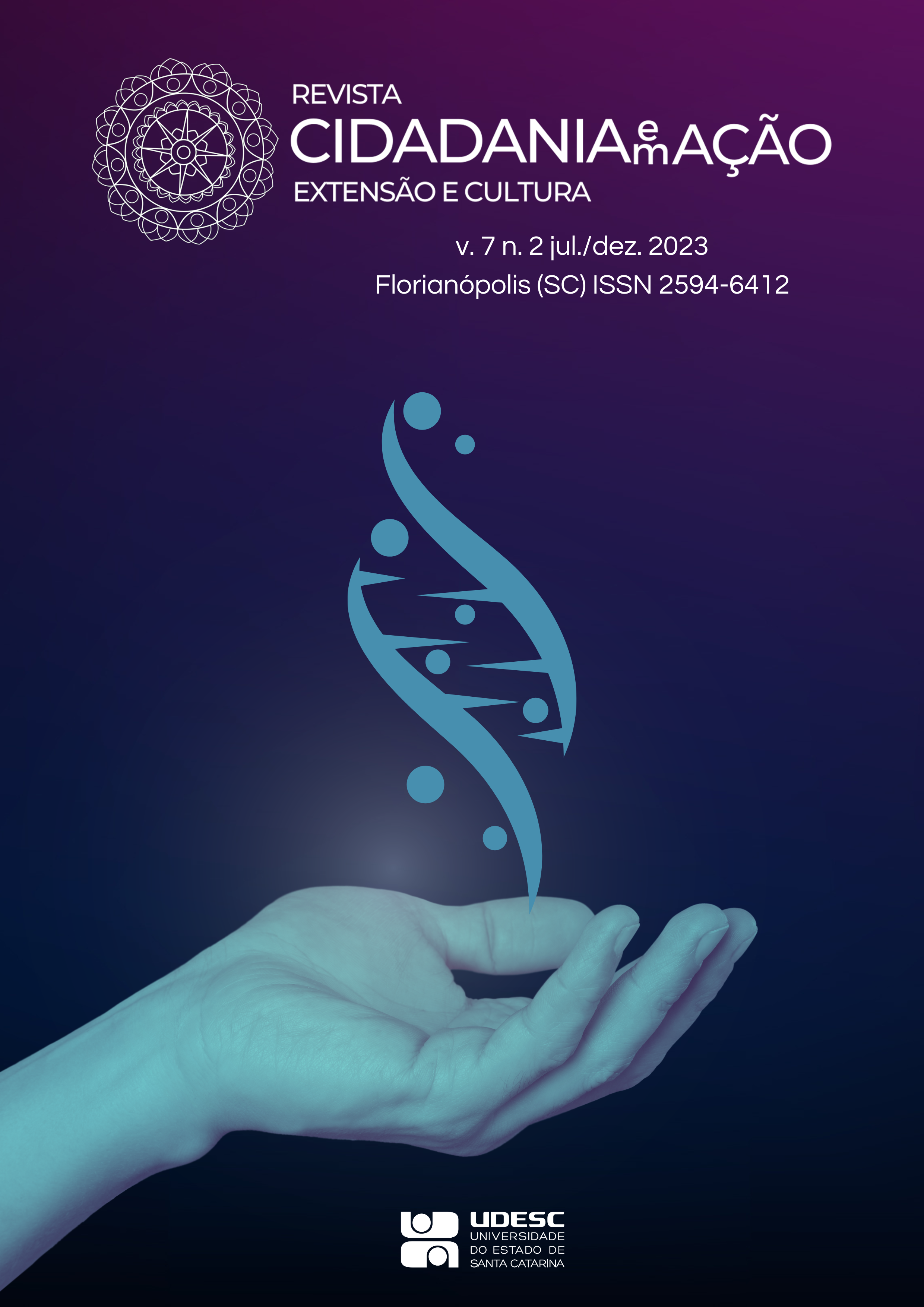“Tech? Pop? Tudo?” Debating pesticides, chemistry and health in an inclusive extension action
DOI:
https://doi.org/10.5965/25946412070220233Keywords:
acessibility, inclusion, chemistry teaching, deaf, blindAbstract
This work presents an extension action involving the topic of pesticides. This theme has been extensively developed, both in teaching and extension activities. However, the differential of the action reported here is that it was all planned to be accessible to the deaf and blind communities, working in a dialogic and critical way (according to Paulo Freire) the Brazilian agricultural development model, especially the intensive use of pesticides. From the documentary “Nuvens de Veneno”, accessible materials were created: Libras window in the documentary; chemical structures of the active ingredients printed in 3D and in high relief with inscriptions in Braille and audio-described; and a printed and audio-described leaflet, contextualizing the problems caused to the environment, human and animal health. All this material was used during the activity at the National Science and Technology Week. The action was carried out both in a booth during the event, at the Federal University of Rio de Janeiro, and in the territory of a state school, during classes of chemistry of six high school classes. During the two days of exhibition at the stand, the activity generated interest from a wide range of audiences, from elementary school children, teachers - who took their classes - as well as a group of deaf students. In the school's territory, the activity moved the classes in a strong way, working on the chemistry of pesticides, social and environmental concerns, including refugee students, with intellectual disabilities, autism and cognitive and intellectual disorders.
Downloads
References
ALTHUSSER, L. Filosofia e filosofia espontânea dos cientistas. Biblioteca de Ciências Humanas, Lisboa: Presença, 1976.
AMARAL, R. B. Vídeo na Sala de Aula de Matemática: que possibilidades? Educação Matemática em Revista, Brasília, v. 18, n. 40, p. 38–47, 2013.
BORBA, M. C.; OECHSLER, V. Tecnologias da Educação: o uso de vídeos em sala de aula. Revista Brasileira de Ensino de Ciência e Tecnologia, Ponta Grossa, v.11, n. 2, p. 391-423, 2018.
BRASIL. Lei Nº 7.802 de 11 de julho de 1989. Diário Oficial da União, Poder Executivo, Brasília, DF, 12 jul. 1989. Disponível em: https://www.planalto.gov.br/ccivil_03/leis/l7802.htm. Acesso em: 09 janeiro 2023.
CARNEIRO, F. F.; RIGOTTO, R. M.; AUGUSTO, L. G. S.; FRIEDRICH, K.; BÚRIGO, A. C. (Orgs.). Dossiê ABRASCO: um alerta sobre os impactos dos agrotóxicos na saúde. Rio de Janeiro: Escola Politécnica de Saúde Joaquim Venâncio. São Paulo: Expressão Popular, 2015. 614 p.
CONFEDERAÇÃO DA AGRICULTURA E PECUÁRIA DO BRASIL, CENTRO DE ESTUDOS AVANÇADOS EM ECONOMIA APLICADA – ESALQ/USP. PIB do Agronegócio. Relatório. 10 de março de 2021. Disponível em: https://www.cnabrasil.org.br/assets/arquivos/boletins/sut.pib_dez_2020.9mar2021.pdf. Acesso em: 09 janeiro 2023.
DOS SANTOS, A. D. G.; DA SILVA, D. V.; MACIEL, K. N. A campanha publicitária Agro é tech, agro é pop, agro é tudo, da Rede Globo de Televisão, como difusora da propaganda sobre o agronegócio no Brasil. Revista Eptic, v. 21, n.1, p. 46-61, 2019.
Fórum de pró-reitores de extensão das instituições públicas de educação superior brasileiras (FORPROEX). Política Nacional de Extensão Universitária. Porto Alegre:UFRGS/Pró-Reitoria de Extensão, 2012.
FREIRE, P. Pedagogia do oprimido. 63 ed. Rio de Janeiro/São Paulo: Paz e Terra, 2017.
FREIRE, P. Educação como prática da liberdade. 14 ed. Rio de Janeiro: Paz e Terra, 2011.
GOTARDI, O. L. N; PIRES, D. X. Abordagem do tema agrotóxico na formação de professores no contexto do ensino de ciências: uma revisão sistemática de literatura. Ensino &Pesquisa, v.19, n.1, p. 06-24, 2021.
MITSURINI, A.; FERNANDES, C. S. A temática dos agrotóxicos: uma análise em livros didáticos de química do ensino médio aprovados no plano nacional do livro didático de 2015. Acta Scientiae, v. 20, n.1, p. 130-152, 2018.
REUTERS. Participação do agronegócio no PIB é a maior em 13 anos, estima CNA. 2017. Disponível em: https://g1.globo.com/economia/agronegocios/noticia/participacao-do-agronegocio-no-pib-e-a-maior-em-13-anos-estima-cna.ghtml. Acesso em: 09 janeiro 2023.
RIBEIRO, D. C. A.; PASSOS, C. G.; SALGADO, T. D. M. A temática ambiental agrotóxicos no ensino de ciências da educação básica: uma revisão bibliográfica. Revista da Sociedade Brasileira de Ensino de Química, v. 02, n. 1, e022102, 2021.
VASCONCELOS, Y (2018) Agrotóxicos na berlinda. Revista FAPESP, ed 271. Disponível em: https://revistapesquisa.fapesp.br/agrotoxicos-na-berlinda/. Acesso em: 09 janeiro 2023.
Downloads
Published
How to Cite
Issue
Section
Categories
License
Copyright (c) 2023 Citizenship in Action: Extension and Culture Magazine

This work is licensed under a Creative Commons Attribution 4.0 International License.












